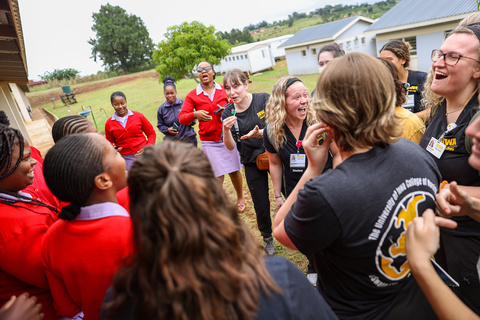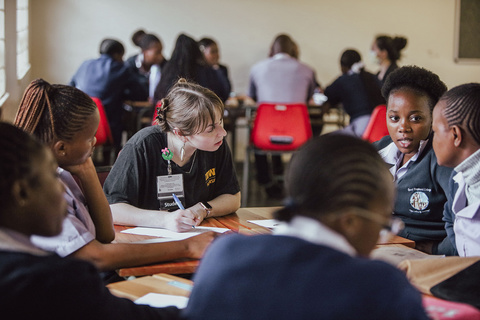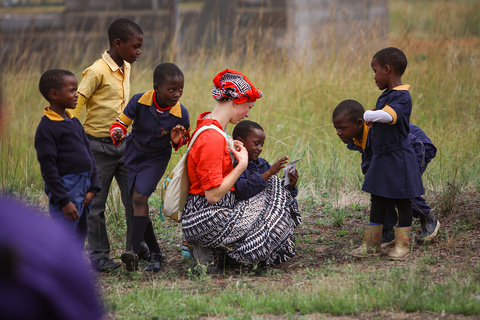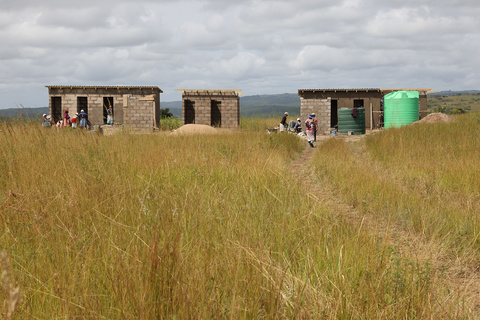Written by Alison Gowans
Photos by Rebecca Miller
Rebecca’s travel was supported by a Stanley International Travel Award, made possible through International Programs and the Stanley-UI Foundation Support Organization.

It’s the end of a day of workshops, and a group of students—a mix of Swazi and American nurses-in-training—is gathered outside of a block of classrooms at Good Shepherd Catholic College of Health Sciences in Siteki, a town in the southern African country of Eswatini, laughing and chatting.
The Swazi nursing students mingle with the small group visiting from the University of Iowa’s College of Nursing, swapping stories and smiles. One student grabs a phone and starts shouting instructions, and suddenly they’re all lining up to film an impromptu dance video.
Even more than the workshops they’d researched, designed, and taught, this bit of cross-cultural exchange and relationship building was at the heart of what their instructors hoped the UI students would take from the experience.
“(This trip) shapes their nursing profession,” Clinical Professor Anita Nicholson, PhD, RN, said. “It shapes how they think and act as nurses, and how they carry themselves throughout their career.”
She and Lecturer Kimberly Nuxoll, MSN, RN, PHN, lead a Community and Public Health Nursing Practicum study abroad course to Eswatini twice a year.

For the 12 students who take the course each spring and fall, the two-week trip is the culmination of a semester of preparation, as they learn about community and public health nursing principles, as well as the country, history, and culture of Eswatini and its public health system.
All UI College of Nursing students must complete a community and public health nursing practicum, but most complete the course in Johnson County, working with nonprofit organizations like Shelter House and the Iowa City Free Medical and Dental Clinic. In Eswatini, they’re working with nonprofits as well - organizations such as Operation Hope, which supports public health efforts through community development, Hosea’s Heart, a home for girls who have survived sexual abuse, and Kudvumisa, a nonprofit that provides home health care in rural Eswatini.
The home health care model is central to public health nursing in Eswatini, where many people live in remote rural communities far from paved roads. Since people must often walk long distances to get to a clinic, having nurses come to them can be an important health care intervention.
Visiting a home also gives nurses a chance to assess the patient’s needs—they can see if the homestead has access to food, clean water, and adequate shelter, what social support a patient has, and other factors that may impact their health. They also will talk with patients and offer a listening ear and support.
“They are looking holistically at the whole person, the whole family,” said BSN student Alyssa Nahnsen (24BSN). “What do they need? What do they have access to? How can I get them connected with what is essential for not only their survival, but also so they can thrive?”
Operation Hope Program Director Nomsa Gamedze said she hoped the students would take that perspective back to the United States.
“The students are benefiting by seeing other communities and seeing how nurses are working, even if it’s not their own country. Maybe there’s something they’ll also copy from us,” she said.

With a shortage of doctors in the country, Swazi nurses are typically the primary health care providers, and they’re often working with fewer resources than the American students were used to.
BSN student Delaney Nesmith (24BSN) described watching a Kudvumisa nurse find a solution to an IV shortage—the nurse delivered the needed medicine using an insulin injection.
“Not only is it creative, it’s resourceful and it’s sustainable,” she said. “It’s this idea to look at a situation and be like, ‘How could we make this better? You can actually do all these things without all the stuff we rely on—you have to really think about the reasons behind the stuff.”
After a week shadowing nurses at Good Shepherd Hospital and visiting different Nongovernmental organizations, the students met Jabulile Dlamini, a community health nurse who runs the Matata Clinic, a private clinic in a small township in rural southeastern Eswatini. She introduced them to EMTs and a government clinic nurse, who discussed how private, public, and nonprofit health care efforts intersect in Eswatini.
The next day, Dlamini took the students to meet community leaders and tour Ngonini Primary school and a Neighborhood Care Point in a very rural community, illustrating just how far some people must travel for health care.
“A monthly clinic is held at the Neighborhood Care Point—and sometimes supplies must be brought in via helicopter due to the poor roads,” said Ngonini Head Teacher Dumisa Dlamini.

The students also saw how a community health nurse like Jabulile Dlamini works beyond her clinic walls.
“Our students come home inspired to broaden their scope from bedside to the entire community,” Nuxoll said. “Nursing students see the role model of a nurse who is both working at a clinic and is also the nurse in the neighborhood, at church, and at the grocery store. Our students are reflecting on, ‘What kind of nurse do I want to be?’…We tell them to consider taking that same assessment approach to whatever community you live in.”
The Code Family Foundation funds need-based scholarships for students participating in the Eswatini course, making the trip possible for many of them.
Their experiences, Nuxoll said, ripple out into their communities.
“It is a gift back to the state of Iowa…because it just changes their focus to being community-minded,” she said. “I do think that it breaks down a lot of biases and also just really opens their eyes to seeing the bigger picture.”
RN-BSN graduate Emily Rosenberg (24BSN) works on the adult oncology unit at MercyOne Des Moines Medical Center. She said she hopes to take what she’s learned and apply it to supporting the care coordinator who works with vulnerable populations at her current hospital.
“It’s been very eye opening,” she said. “I didn’t really understand the difference between being a community nurse and being a bedside nurse.”
► Read more from the 2024 Iowa Nursing Magazine
